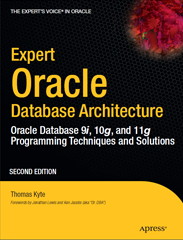You can now download "Expert Oracle Database Architecture, 2nd Edition" book free from here.
The author of book is Thomas Kyte who is the best expert in Oracle Database.
It covers the development up to version 11g.
You can download this book and enjoy by your time.
Regarding my review it is the best book can learn you more details about database kernel and database programming.
Thanks
Mahmoud A. El-Sayed
The author of book is Thomas Kyte who is the best expert in Oracle Database.
It covers the development up to version 11g.
You can download this book and enjoy by your time.
Regarding my review it is the best book can learn you more details about database kernel and database programming.
Thanks
Mahmoud A. El-Sayed


